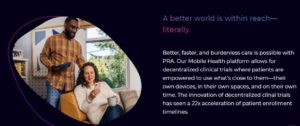
This post by Johanna Ryan continues a set of posts looking at the changing world of clinical trials – See Clinical Trial Fraud. These feed straight into and add to the points made in a series of lectures on how trials have developed over the last 3 decades – Clinical Trials Are Not Safe, People are the Data in Clinical Trials and They Used to Call it Medicine – they make the world of Study 329 look innocent and ethical compared with what is now happening.
Virtual trials are on no-one’s radar and this post feels like a harbinger of a nightmarish future.
Medical care goes virtual
Telemedicine has taken over a great deal of medical care since the start of the Covid-19 pandemic. It seems likely to stay that way after the virus is tamed. A lot of investors are betting on this: “Telehealth” startups are multiplying, both at your doctor’s office and on the Web.
I can’t deny it’s convenient. If you’ve seen the doctor before, and know she just needs to ask a few questions and refill your script, it’s great. Why use up a whole sick day to see her in person? But maybe you have a brand-new symptom—let’s say “abdominal pain.” Is it just a bad plate of nachos, or a medical crisis? A doctor might need to prod and poke the patient, watch them move, even smell them perhaps, to know for sure.
It doesn’t take much imagination to see that a bad guess either way could cause harm. And that’s assuming the doctor already knows you, and is acting honestly. That’s not always true: Prosecutions for telemedicine fraud have skyrocketed in the Covid-19 period, and some experts warn the losses could hit $1 trillion soon if nothing is done.
So how about Virtual Research?

It may seem like an absurd question, but it’s not. Can new drugs be tested on patients who sign up on social media, and get their pills delivered by Uber? Can researchers follow how they’re doing via Zoom calls and online questionnaires? Can a drug be cleared as safe and effective based on virtual research?
For most of the medical establishment, the answer is YES. “Decentralized” clinical trials (those that are either totally or partially virtual) are widely hailed as the wave of the future. Major drug companies are embracing this trend; Pfizer and Biontek credit decentralized trial technology for helping them conduct Covid-19 vaccine research at warp speed. Boehringer-Ingelheim and Novartis signed deals with Science37 to expand their decentralized-trial capacity well before the pandemic.
Science37 is both the current industry leader in remote-trial software, and its loudest advocate. Decentralized trials, they claim, will save billions by speeding up patient recruitment and reducing dropout rates. They can also open up access to research studies for marginalized patients who may live far from the big teaching hospitals, or lack money for transportation and doctor visits. That will empower patients, says Science37, while improving research quality by diversifying the patient pool. Meanwhile, life-saving new treatments will get to market faster than ever. Everyone wins!
Or do they? Based on what I know about “in-person” research these days, I’m not sure.
“Ghost Research”:
the current standard in clinical trials
A few months ago I wrote for RxISK about a series of arrests for clinical-trial fraud in the USA. The cases involved important studies published in top-line medical journals. The fraudsters, however, were not the leading academic experts listed as authors of those studies. Most were decidedly small-time: local docs running busy family practice clinics, who saw clinical research as a lucrative side job.
More and more medical research is carried out by doctors like this. They are usually recruited by large Contract Research Organizations (CRO’s) hired by the drug company, paid by the job (or patient), and located hundreds of miles from the big teaching hospitals where the study’s official authors are based.
In other words, it’s Ghost Research. The distinguished “authors” do not merely lean on Ghost Writers to draft an article that makes their work (and the study drug) look as good as possible. The work itself is contracted out, to dozens or hundreds of nameless doctors. Often the “authors” will not have given the study drug to a single patient, and thus have no first-hand knowledge of the results.
What will happen when a trial like GSK’s VESTRI goes remote?

The most high-profile trial involved in the fraud was VESTRI – GSK’s safety study of its Advair asthma inhaler for use in children. Data from the fraudulent Miami trial site was removed from VESTRI, GSK stressed. But the Cleveland-area fraudsters had worked on VESTRI too, and it wasn’t clear what had happened to their data. At a third site, Choice Medical of Toney, Alabama, the director had been convicted of running an opioid “pill-mill” while doing her research for GSK. No one was even talking about that one.
Toney was not the only small southern town where patients had “access” to GSK’s research. Scottsboro, Alabama and Port Gibson, Mississippi were included too, thanks to Parexel, the giant CRO running the VESTRI trial for GSK. ClinicalTrials.gov listed 36 trials involving the Scottsboro Quick Care Clinic – and 42 in Port Gibson, population 1,4oo and shrinking. Are low-income rural citizens being “empowered” or exploited by all that research – and will things be better or worse when Science37 brings more clinical-trial opportunities to their smartphones?
Reviewing last year’s fraud cases, I also had to ask: How many similar outfits are still in business? Their schemes had not been all that clever: Some simply mailed in their own blood and urine samples under various invented names. Others used data from actual patients at the local clinic, who never took part in the study. The monitoring must be pretty “remote” already, if clowns like that could slip through. In fact, I learned, the FDA was already advising drug companies and CRO’s on “risk-based monitoring” plans, where only the dodgiest-looking sites need be inspected in person.
How easy would it become to slip past such monitoring, if the research itself went remote? It’s already far too easy for hackers to file for unemployment or take out a mortgage in your name. Adding 5,000 fake followers to a Twitter account, or setting up a dozen fake profiles on a dating app, is easier still. If you’re on Medicare, medical crooks can bill the government for fifty “treatments” you never got. Inventing fake research subjects might become an industry.
Patient fraud is possible as well. A decade ago, psychiatrist Tom Shiovitz noticed newly-unemployed people signing up for his studies just to get the payments issued to volunteers. Some were driving from clinic to clinic, claiming to have migraines in the morning and schizophrenia after lunch. And yes, they were fooling the researchers. Dr. Shiovitz launched CTSDatabase.com, the first of several firms that sprang up to help clinics weed out such “professional subjects.” That too could be a lively business once remote trials get underway, and the jobless can be tempted to sign up for a dozen online studies.
Fraud is not even the biggest problem

“Bias in choosing the question is a much bigger problem than lying about the data.”
Dr. Robert Califf, former FDA head
The biggest problem with Randomized Controlled Trials – especially when designed by the drugmakers – is that they can narrow their focus to one “outcome” rather than all the drug’s effects. If the people taking the pill can’t report unexpected results (good or bad), or the impact on their overall health, a drug that does more harm than good can be made to look like a success. Too often, in “normal” pharma-sponsored RCT’s, patient reports are ignored or explained away.
Virtual trials may go even further, making it close to impossible to report the unexpected. All you will be able to do is answer the questions “asked” by the online platform.
A recent article authored mainly by Eli Lilly employees explained how “choosing the question” allowed Lilly to cut the number of adverse effect reports in half for its migraine drug Lasmiditan. Subjects taking the drug at home for migraine attacks had to report their reactions in “real time” via an online questionnaire, which asked for “unusual” symptoms they had “not felt with a migraine before.”
Another paper in JAMA described a 2020 trial conducted 100% remotely under pandemic safety rules. It tested a theory that the antidepressant Luvox had anti-inflammatory properties which might prevent “clinical deterioration” in Covid-19. Patients diagnosed at primary-care clinics were signed up via email, had pills and pulse oximeters delivered to their homes, and reported their results online.
The study was pretty much a bust. About 20% of subjects stopped reporting, the criteria used for “severe” disease were flawed, and the modest advantage for Luvox was judged meaningless. But what struck me was that only virus-related side effects like fever, headache and muscle pain were reported. Most Luvox trials for psychiatric problems found nervousness, agitation and insomnia in at least some patients, and fatigue or sleepiness in others—not to mention dry mouth, sweating and erectile dysfunction. How did all those problems magically disappear in the Covid-19 group? Most likely, they weren’t asked.
A taste of things to come
ClinicalTrials.gov lists eleven trials involving Science37, the virtual-trial specialists. Some involve fairly benign-looking treatments, such as topical creams for acne. One, however, involves home-based chemotherapy for metastatic cancer, while another will test a new antidepressant known only as BI-1358894. Both are “Phase 2” studies evaluating safety as well as effectiveness.
The antidepressant study lists no local contacts – only Science37 of Culver City, California. A note from the drugmaker promises to eventually share the data with qualified researchers. I hope someone will take them up on that, if only to find out what “virtual trials” look like from the inside.

Success Story: GSK – A breakthrough in the virtual world with Dreamcast
https://eventpreneur.in/success-story-gsk-a-breakthrough-in-the-virtual-world-with-dreamcast/
GSK experiments with digital biomarkers to optimize clinical trials GlaxoSmithKline (GSK) is experimenting with wearable mobile health devices linked to cloud services in clinical trials as part of a bid to better engage with patients, speed up the process, and capture data more effectively. GSK is working with Medidata, Vital Connect, and ActiGraph to test six healthy human subjects and see how the wearable sensors perform. The joint initiative assessed the capabilities of mobile health sensors tools and evaluated how they could be used to enable a new model for clinical trial conduct that aligns site and patient needs with faster study execution and reduced costs.
https://www.tcs.com/content/dam/tcs/pdf/Industries/life-sciences-and-healthcare/Digital%20Reimagination%20of%20Clinical%20Trials.pdf
Digital Reimagination™ of Clinical Trials
Big Harma have also realised they can use digital exclusion to secretly exclude those most at risk of having side effects from their drugs and vaccines. All they have to do is collect data using a digital diary and have that as part of the study protocol.
Of course, to use a digital diary, you must be able to use a digital device like a smartphone, tablet or computer. And you have to be able to remember your login and password details, recall that you need to fill out the diary every day, and remember that you have side effects. Which is fine is you’ve ever owned or used a digital device and you have a good memory.
If you take the recent COVID vaccine trials as an example, you’ll already know that the average age of death is well over 80 years old. Which means that your target demographic has at least a 1 in 6 risk of already being diagnosed with dementia (your chance is about 50/50 if you’re 90 years old). They have an average age of “retired in the last millennium long before the first iPhone was invented.” They’re also most likely to have been living on a state pension which doesn’t leave them enough money to heat their homes or buy nutritious food, let alone own a smartphone. More recent research confirms that the top comorbidity in those who died from COVID is indeed dementia.
The drug companies are very aware that dementia is an insurmountable obstacle to using a digital diary. They also know that any sort of inflammation or toxicity effect can aggravate confusion in a person with dementia or even mild cognitive impairment and that can make them unable to use a digital diary. And they know that many of these people live in care homes and that during lockdown they weren’t allowed visitors. So there was nobody to assist them in using digital diaries even if they had wanted to.
Many people have written about how few high risk elders were included in the vaccine trials and how the trials focused on healthy younger people. It’s pretty clear how they managed to do this. And it’s pretty clear why they chose to do this. They obviously wanted to exclude those most at risk of side effects. Because if they had been confident that their products worked to reduce death, they would have mostly focused on people over 80 years of age with multiple comorbidities.